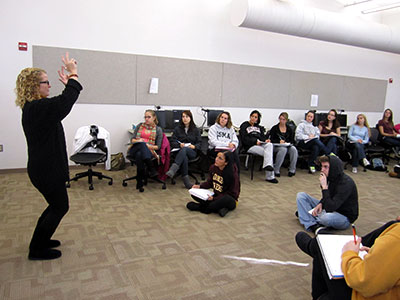Dr. Deborah Stryker Program Coordinator, Teacher of the Deaf, SLED Faculty Advisor
Courses That Dr. Stryker Teaches

- ASLTERP 155 - American Sign Language I
- DEAFHH 201: History, Education, and Guidance of the Deaf
- DEAFHH 325 - Practicum at Camp HERO
- DEAFHH 462/562 - ASL/Signed English in Educational Settings
- DEAFHH 560 - Practicum with Deaf/Hard of Hearing
- DEAFHH 566 - Language for the Deaf/HH I
- DEAFHH 567 - Language for the Deaf/HH II
- DEAFHH 575 - Counseling Individuals with Special Needs
- DEAFHH 584 - Research in Deaf Education
- DEAFHH 570 - Student Teaching Deaf/HH
- DEAFHH 493/593: Seminar for Student Teachers
ASLTERP 155 - American Sign Language I
Introduces students to communication in American Sign Language (ASL) as it is used within the American Deaf Community. Involves a study of vocabulary, grammar, fingerspelling, the history of ASL and its recognition as a language. The major focus will be the demonstration of beginning expressive and receptive conversational ASL skills. This course earns one GEP towards Goal 1 Communication and two GEP toward Goal 8 Second Language in general education.
DEAFHH 201: History, Education, and Guidance of the Deaf
Explores the education of deaf/hard of hearing individuals with emphasis on the history of educational procedures and guidance in communication, psychological and vocational habilitation. May be offered in traditional and distance education formats.
DEAFHH 325 - Practicum at Camp HERO
A supervised, field-based practicum in which students plan and implement lessons at a week-long camp for the deaf and hard of hearing. Lessons will focus on language development, reading, writing and following directions.
DEAFHH 462/562 - ASL/Signed English in Educational Settings
Study of the expressive and receptive methods of using Signed English and American Sign Language for deaf and hard of hearing students in an educational setting.
DEAFHH 560 - Practicum with Deaf/Hard of Hearing
Provides an opportunity to work with deaf/hard of hearing children and/or adults. Emphasis on speech and language remediation of deaf/hard of hearing individuals.
DEAFHH 566 - Language for the Deaf/HH I
Study of the principles and techniques used in the development and correction of language for deaf/hard of hearing individuals. Student is familiarized with leading systems of natural language development designed for the deaf/hard of hearing. The step-by-step development of at least one language system is required for each student. Supervised demonstrations are an integral part of the course.
DEAFHH 567 - Language for the Deaf/HH II
Study of structured approaches to teaching spoken and written language, of language assessment devices and appropriate lesson planning. Supervised demonstrations and presentations are an integral part of this course.
DEAFHH 575 - Counciling Individuals with Special Needs
Designed to help students identify counseling needs of communicatively disabled individuals and their families and to provide basic, short-term counseling. Students introduced to various counseling strategies in individual and group settings as appropriate to schools and speech and hearing clinics.
DEAFHH 584 - Research in Deaf Education
This course will concern itself with research in the field of the education of the deaf and hard of hearing. Research studies and other information concerning communication, education, psychology, learning problems, and other topics related to deaf and hard of hearing persons shall be considered. The course treats equally all levels of hearing loss (i.e., hard of hearing, multiple special needs deaf, etc.). The student will be expected to continue a study of her/his research problem (begun in the Fall) and refine chapters 1-3 and create chapters four and five of her/his departmental paper on the problem.
DEAFHH 570 - Student Teaching Deaf/HH
Evaluates hearing losses affecting the communicational, educational, and vocational adjustment of individuals through supervised observation, classroom practice, and practicum experience. Students are assigned to approved private and public programs for the deaf/hard of hearing and work with selected professionals in education of the deaf/hard of hearing, following the same schedules and responsibilities similar as professionals. Arrangements relating to student interest must be approved by program adviser. Permission of curriculum coordinator required.
DEAFHH 493/593: Seminar for Student Teachers
Presents instruction in the development of effective teaching of individuals who are deaf/hard of hearing. Focuses on problems in the education of this population. Discusses its relationship to teaching as each problem is defined. Helps the future teacher meet practical problems in guiding individuals who are deaf/hard of hearing in learning experiences at school.